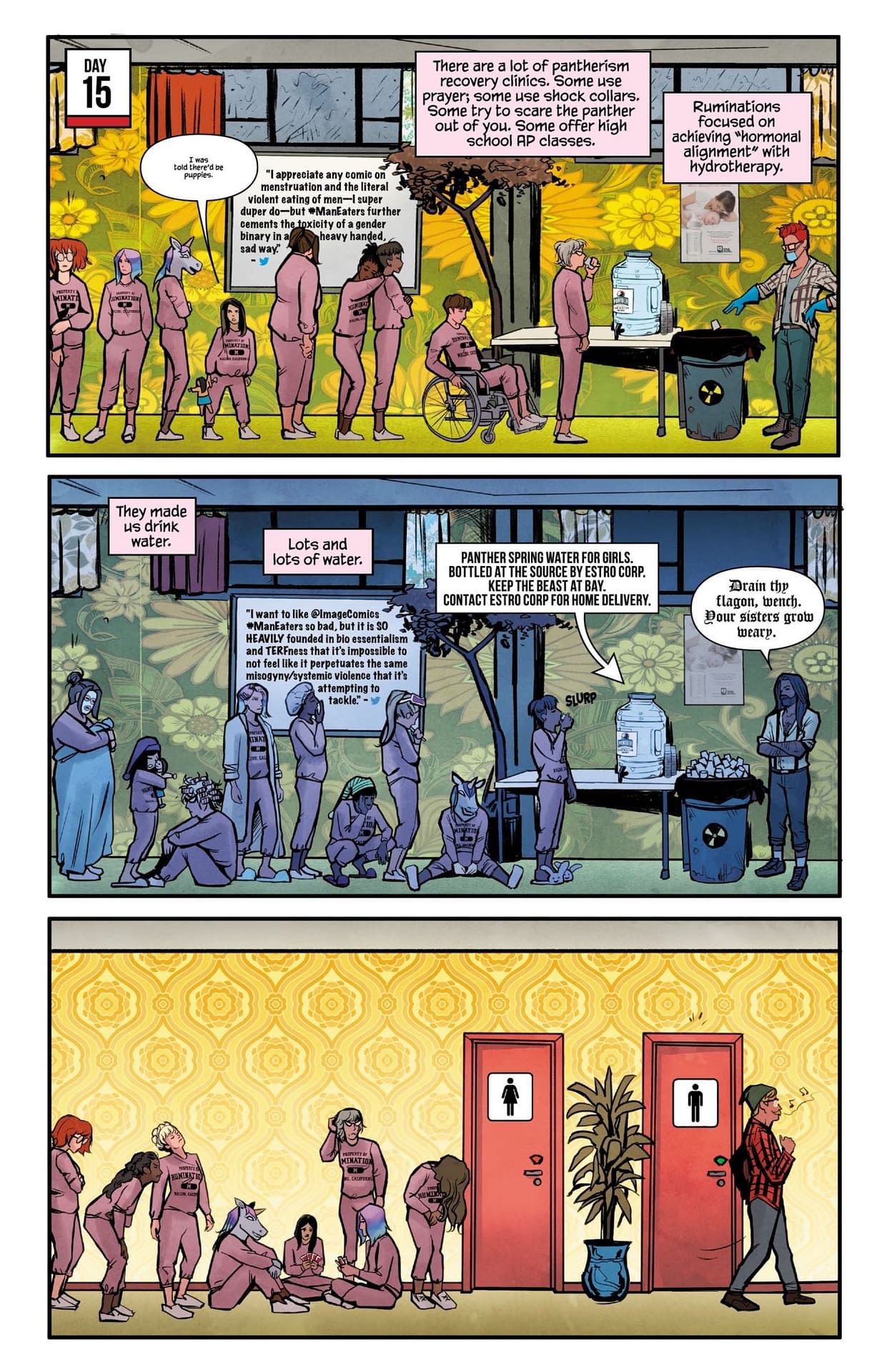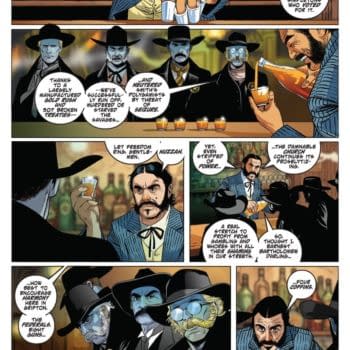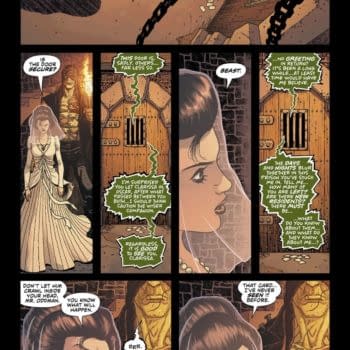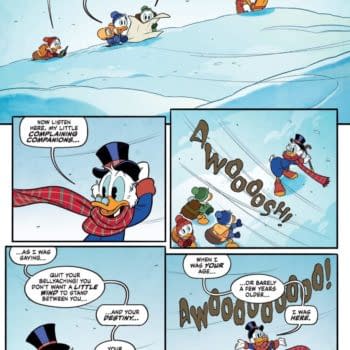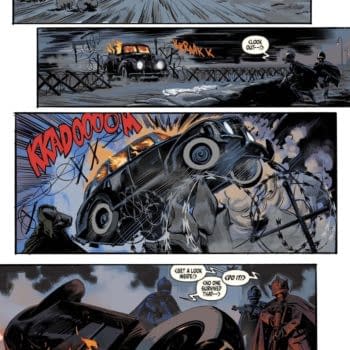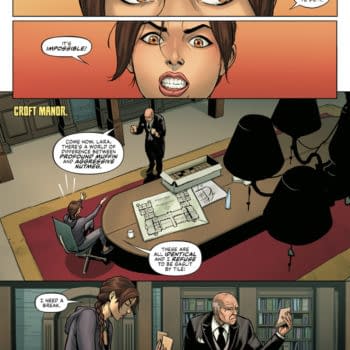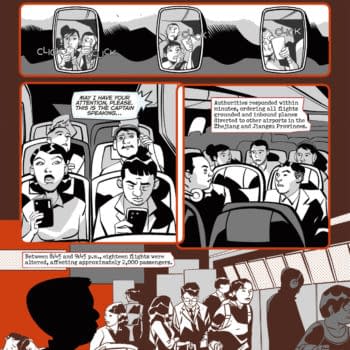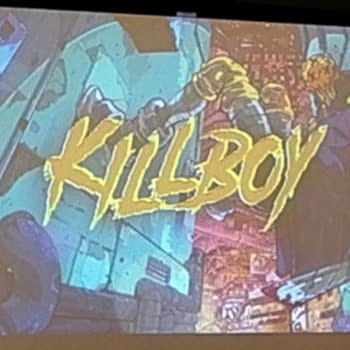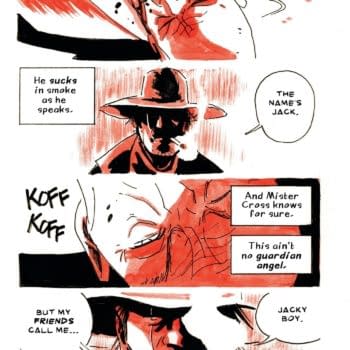Posted in: Comics, Image | Tagged: chelsea cain, image, man-eaters
Ask Chelsea Cain About Her Trans-Exclusionary Radical Feminist Agenda
Writer Chelsea Cain has had a tumultuous past relationship with social media. Cain briefly quit social media in 2016 after backlash to the cover of Mockingbird #8 (which Cain wrote, though the cover was drawn by Joelle Jones), in which the titular hero wore a t-shirt which famously invited readers to "Ask Me About My Feminist Agenda." It was a defining moment for the comics medium presence of Cain, who is known primarily as a novelist. Cain announced her return to comics in 2018 with Man-Eaters, a comic in which girls are transformed into killer were-cats, a transformation caused by menstruation.
A mutation in Toxoplasmosis causes menstruating women to turn into ferocious killer wildcats—easily provoked and extremely dangerous. As panic spreads and paranoia takes root, the fate of the world rides on the shoulders of one twelve-year-old girl. Part Cat People, part The Handmaid's Tale, all pro-feline agenda.
MAN-EATERS—Cain's first comic since Mockingbird lit up Twitter and made international headlines—is produced for Image comics by Ministry of Trouble, a production company founded by Cain and Miternique in 2017 with the mission of making trouble.
As a follow-up to the controversy of the Mockingbird t-shirt, the satirical concept of Man-Eaters is thumb in the eye to those who complained about that feminist agenda. However, the comic immediately fell under criticism for its focus on menstruation as the defining characteristic for women in the comic, thus excluding the experiences of transgender or nonbinary people in Man-Eaters' dystopian metaphor.
Cain responded to some of that criticism, including in an interview with Women Write About Comics:
And can you tell me if/how the book will tackle what this kind of hormone therapy means for characters who aren't cis?
I think it's really important to tell stories from a lot of different points of view. This is a story about what it's like to be a cis gendered female coming of age in a culture that consistently reinforces the messaging that periods are shameful, that our bodies are shameful, and that womanhood—and the biology that goes along with it—is something gross and not for polite company. It's about rejecting that narrative and making something powerful from it. You don't have to have a uterus to be a woman. Anyone who thinks that hasn't been paying attention. But let's not get lost or distracted here—this is a specific story, about a specific experience—the way that all good stories are. And if I'm doing my job well, I think that anyone can relate to it. I think that someone who is trans knows full well what it feels like to struggle with being defined by biology and by the social messaging that makes us all, at one point or another, feel like monsters.
As well as on Twitter:
But 9 issues into Man-Eaters, that binary view of gender is still present in the book and continues to be criticized. Cain has occasionally responded to that criticism, most relevantly for this story to one particular reader, who stated on Twitter back in May, "I want to like @ImageComics #ManEaters so bad, but it is SO HEAVILY founded in bio essentialism and TERFness that it's impossible to not feel like it perpetuates the same misogyny/systemic violence that it's attempting to tackle."
TERF is an acronym that stands for Trans-Exclusionary Radical Feminist, in other words, someone who espouses feminist beliefs but does not believe that transgender women count as women, attempting to exclude them from women's spaces.
"I appreciate any comic on menstruation and the literal violent eating of men—I super duper do—but #ManEaters further cements the toxicity of a gender binary in a heavy-handed, sad way," another tweet from the same person said.
At the time, Cain responded to these tweets, saying, "Again, thanks for the feedback. Seems like you're a regular reader. Which is…weird. Because you hate us. I'm so grateful for the work of our three 14-year-old contributors. And then I read comments like yours, and I think WHAT HAVE I DONE?" and "We will work on being more nuanced. And less specific. I guess I think of stories as points-of-view. As in, a person's story in the world. I guess I thought that being specific was kind of the reason I was doing this."
However, in the recently released Man-Eaters #9, both of the reader's tweets were featured in the pages of the comic, plastered on billboards on the wall of the forced reeducation camps in the book. As the panels blew up on social media, the original reader noted that she was feeling overwhelmed and was turning off her notifications, which is why her tweets have been quoted, rather than embedded, above, in an attempt to respect anonymity as much as possible, even if that cat is already out of the bag, thanks to all of this.
Once pointed out, this has, as one might expect, not gone over very well, with fans, critics, and fellow comic book creators taking to Twitter to comment on it.
Though some did come to Cain's defense.
After remaining silent for the early part of the day Saturday as the furor grew on Twitter, Cain initially responded:
Which led to further discussion of Cain's reaction to criticism.
A few hours later, Cain took another try at a response, tweeting a public statement:
And responding to a few tweets directly:
And then one more statement:
As Cain notes, Man-Eaters has three more issues yet to hit stores, with Man-Eaters #12 tentatively scheduled for release in September, though September's solicitations have not yet come out. On Sunday morning, Cain returned to Twitter, this time to solicit trans sensitivity readers for the remaining issues.
However, the work would be done without monetary compensation, with Cain offering to send comics instead. Can you guess that this didn't go over very well either?
Eventually, Cain said she would speak with Image Comics about funding a sensitivity reader for the comic.
Though she then continued:
Before finally tweeting:
For publisher Image Comics, it's the latest in a series of recent controversies surrounding transgender issues in the comics they publish, with Airboy in 2015 and Divided State of Hysteria in 2017, which, like this time around, also occurred during Pride Month. Image keeps a tweet pinned to the top of their timeline with the following disclaimer:
We reached out to Image Comics, but they declined to comment.


